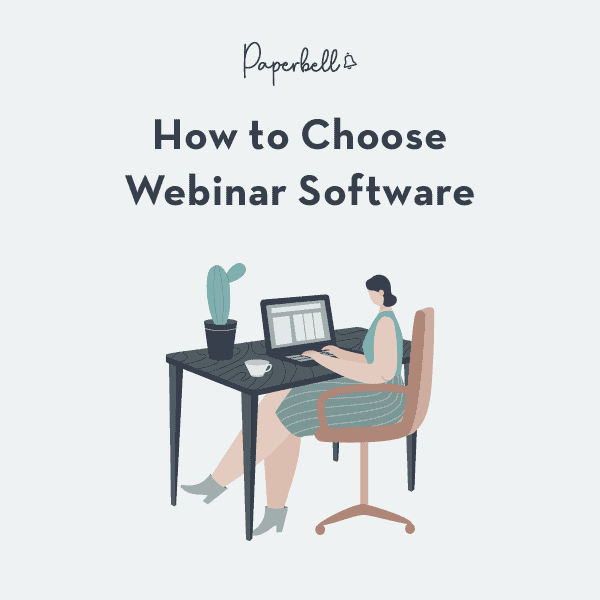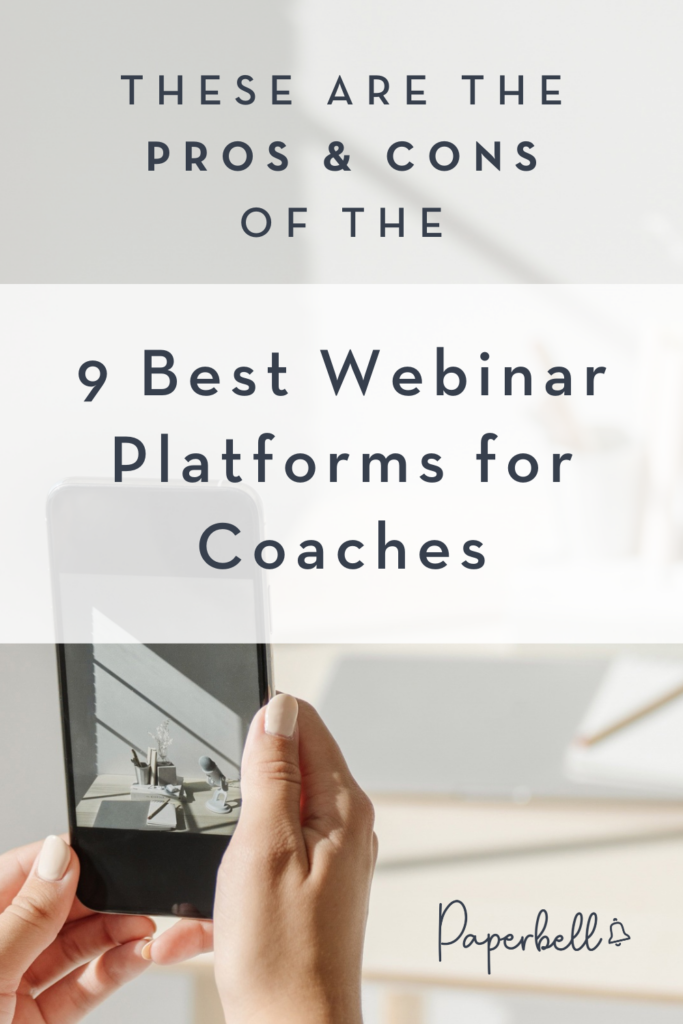Webinars are one of the most widespread marketing tools today, used virtually (no pun intended) in every niche.
They are an easy way to deliver important lessons to your audience and earn their trust to work with you or buy from you in the future. With the wide array of webinar tools available online, it’s never been easier to set up and promote your own event.
In this article, we’ll give you some tips on what to look for when choosing a webinar software, introduce some of the best webinar platforms coaches use, why they’re so popular, and how much they cost. We hope that by the end of this guide, you’ll be ready to get started on your next event and send out your first invitations.
What Is a Webinar?
Webinars have practically become their own standalone genre in the online marketing space. Whether you had to adapt to the new normal and transfer your in-person seminars online or you picked up webinars as a new client-acquisition tool, it’s one of the best ways to earn the trust of your audience.
A webinar typically runs for 30-60 minutes and revolves around a key topic related to your field of expertise. For example, if you’re a relationship coach, you can organize a webinar about conflict resolution for couples or an introduction to attachment styles. The more specific your subject is, and the closer it is to your profile, the more likely your attendees will be interested in working with you.
Some webinars are pre-recorded and can be accessed right after registration. These tend to be evergreen webinars that are about a topic that will always be relevant to your customer and for which it doesn’t matter when they sign up for the webinar.
For new or interactive topics, webinars are often held via live streaming, so they provide an opportunity for attendees to interact with you in the form of submitting comments or asking questions live. You can also combine both approaches and make your live webinar interactive, then later share the recording of it with other registered participants who couldn’t attend.
Webinars are one of the most effective conversion tools coaches can use to give value to their prospects and then introduce their packages. You can give special discounts to your attendees or share a limited-time offer with them via email as a follow-up to your event.
Why Should Coaches Use Webinars As a Marketing Tool?
By leveraging the power of webinars, you can enhance your marketing efforts and grow your coaching business. Let’s look at some of the ways you can use webinars to your advantage.
1. You Can Build a Personal Connection With Potential Clients
Imagine someone is searching for a “life coach” on the internet; it’s very unlikely they’ll land on your site and just book a 10-session coaching package with you. Before they know they can trust you, they’ll want to know what you’re all about, who you are, and what you can offer them.
Offering a webinar allows these potential clients to connect with you on a more personal level before they commit to any of your programs. If you host webinars, you can give people the chance to ask you all their burning questions, which allows you to build trust and rapport with them. This initial step can help you build stronger client relationships and client loyalty long-term.
2. Showcase Your Authority and Expertise
Why should someone trust you as their coach just because you have a certification? You want to add value to the coaching space, and one of the best ways to do this is with webinars. Maybe you offer a workshop on an area of life coaching you regularly get asked about or an introduction to coaching for those new to the concept.
If you can share valuable insights and groundbreaking content, you can prove your authority in the coaching space, which can help potential clients trust you and want to work with you.
3. Webinars Are Great Marketing Tools
Hosting a webinar is a very cost-effective way to reach lots of leads who are interested in your service as a coach. It’s your perfect chance to convince them that you’re the right coach for them (or not, which is also good because you want clients you align with).
Instead of spending money on ads that are shown to people who may or may not want your coaching services, a webinar is the perfect opportunity to speak directly to potential clients.
You don’t need much equipment, a marketing team, or knowledge of navigating advertising when you host a webinar. All you need is a webinar platform, a good internet connection, and your knowledge. No need to travel or speak at events to showcase how amazing your coaching skills are.
Automated webinars are an even easier way for people to get to you and you don’t even need to block time in your diary. In exchange for an email address, your leads can get access to a pre-recorded webinar about one of your favorite topics. They learn something, potentially become a client and you only need to do the work one time. It’s a win-win for everyone.
4. You Can Reach a Global Audience
When you start hosting webinars, you’ll soon find that people attend from all over the world. Webinars break down geographical barriers which means you have a wider reach for potential clients.
This improves your chances for growth and building relationships with clients independent of where they’re located.
5. Webinars Attract High-Quality Leads
Owning a small business isn’t easy and the last thing you want is to waste time answering the questions of people who have no intention of becoming a client.
Webinar attendees tend to be highly engaged leads who have a genuine interest in your business and want to learn more from you. They’ve set aside time in their calendar to attend your webinar after all.
In a webinar, you also get the chance to dispel any objections your leads may have about your business. This interaction helps you gain a better understanding of who your potential client is and how you can best serve them.
[ Read: Five No-Spend (or Low-Spend) Ways to Get Coaching Clients, Fast ]
7 Things to Consider When Choosing Webinar Tools
When choosing your webinar software, there are a few criteria to consider so you don’t waste time or money on a tool that isn’t right for you and your business.

1. Features and Functionality
Make a list of your requirements for when you host webinars, so you can judge whether or not the software has the right features you need.
For example, will you host interactive webinars? If so, you’ll need to make sure you choose a webinar software with interactive features such as polls, screen sharing, interactive whiteboards, emoji sharing, and question-and-answer features.
If you know the features you’ll need the most, you can choose webinar software that helps you deliver effective and engaging online meetings.
You also want to make sure the platform you choose offers high-quality video, especially for pre-recorded webinars. If you want to build trust with your customers and present your business in a professional way, the quality of your content is very important.
2. Reliability and Performance
It’s all very well if a platform has all the features you need, but if it crashes all the time, it’s no use to you. A webinar tool that you can rely on when you go live is very important for your professional image.
You also want a platform that can work even if you don’t have the most stable internet; some tools require you to have a stable connection at all times, or they will fail. Check reviews for the tools you’re considering and make sure they have a reputation for being stable and reliable.
Choosing a new-to-the-market solution may seem tempting if it has key features you want, but if you don’t know whether or not you can rely on it to deliver your online events, you could be wasting your time.
3. Security and Privacy
This is a big one. When choosing the best webinar software for your needs, you want to ensure it has strong privacy settings and prioritizes the security of your clients.
At a minimum, password protection, encryption, data protection features, and being GDPR compliant are all important things the tool you choose needs. You also want to make sure you can control attendee access to the webinar so random people don’t drop in to live events and spam your clients.
4. Ease of Use
When you host a webinar, you want it to be easy for your clients to sign up and attend and easy for you to host so you can focus on giving your live presentation.
The best webinar software platforms have intuitive designs and are easy to use. You don’t want a platform for webinars that requires technical expertise to use; it should be self-explanatory.
Complex user interfaces will make the user experience poor, make it more difficult to engage attendees, and, overall, provide a bad experience for everyone. You don’t want clients or potential clients associating your brand with a poor user experience, do you?
5. Attendee Capacity and Scalability
Think about your audience size and whether the platform will be able to host potential growth in the future. Can the webinar platform you choose accommodate your audience and handle a larger number of attendees should you need it to?
You should also consider the time limit for your events and plan with buffer time, as many video conferencing tools will have a time limit for each meeting (especially if you choose a cheaper or free plan).
Some platforms have limits on the number of attendees or the number of downloads, so check these limitations before paying for your plan.
6. The Price Plan
Unfortunately, low-cost webinar platforms aren’t necessarily the best webinar option for coaches.
There’s a huge variety in what you can get for your money when it comes to the price plans of each webinar software. Keep a budget in mind, and think about the non-negotiable features you want your webinar platform to include.
When you compare webinar platforms and their payment plans, look out for robust features and think about what you might need long-term, not just for a single webinar. For example, in the future, will you need to have breakout sessions or automated email invites?
Free webinar hosting platforms often have limitations on the number of people you can host, the length of the webinar, and whether or not multiple replays are possible.
However, when you’re starting out, sticking with a free version can be good so you can get a feel for the features you need the most. You probably don’t need to host up to 500 attendees when you’re starting out as a coach! Paying for subscription plans that are way over budget and don’t provide enough value could damage your business’ bottom line.
7. Customer Support
While this may not be the most important thing on your list, you don’t want to choose a webinar software that has terrible customer support.
What if you run live webinars and you keep encountering problems with the platform? You want a brand that will help you solve the issues quickly and seamlessly.
There’s nothing more frustrating than dealing with a customer support team you can’t get hold of or that doesn’t care about your account. It’s a waste of your precious time.
Checking the reviews of the webinar platform you’re considering will soon help you see if the platform cares about its customers or not!
9 of the Best Webinar Platforms

1. Facebook Live
Facebook Live is a free option for streaming webinars live, but as with many other tools, choosing the free option comes with a “price.”
You can stream live for up to 8 hours on Facebook with no limit on how many people can watch and comment on your live video. However, since it’s a social media platform, there will be plenty of distractions for your attendees, which normally results in less commitment and a shorter attention span.
Since there’s no registration required, you won’t be able to collect the email addresses of your attendees to follow up with them later, and unless you run your webinar in a closed group, you might also have to deal with trolling or spam comments.
Good if you’re starting out and don’t want to commit to a paid plan, but you’ll probably graduate from Facebook Live pretty soon if you decide to continue going down the webinar route.
2. YouTube Live
Similar to Facebook, YouTube allows you to stream your video live for free (once your channel is verified) and later posts the recording of the webinar on your channel. There is no limit to how many people can attend, but there is also no way to moderate spam comments or collect contact details from your leads.
YouTube will also feature other videos and ads all over your content which are very distracting for the viewer. Since ads are tailored according to the user’s interests, there’s a great chance they will be about your competitors, which can make you lose your new potential clients to them.
Using YouTube Live as a marketing tool is a great way to find people and get your brand in front of those who may not have found you and signed up for a webinar otherwise. However, beware of the limitations and potential for spammers.
3. Zoom
Zoom is more popularly known as a video meeting platform, but they offer plenty of options for webinars of all sizes as well. You can use Zoom to host a free webinar with up to 100 participants on your call if it doesn’t run longer than 40 minutes. This option is ideal for short 30-minute webinars for a limited number of attendees.
[ Read: 6 Virtual Meeting Platforms to Use for Your Coaching Sessions (and Our Top Pick) ]
If you’re aiming for something bigger, you can also consider their paid plan dedicated to webinars. It starts from $642 a year for 500 attendees and includes unlimited webinar sessions for up to 30 hours (which is more than you’ll ever need).
You can add custom branding to your calls and live stream them on third-party platforms such as Facebook or YouTube to reach more people. You can also monetize your webinars with paid registration and export the list of contacts who signed up for your webinar.
Zoom lets you make recordings of your live webinars which make it easy for you to add automated evergreen webinars to your website. Perfect if you want to sell your programs while you sleep!
The downside of Zoom is that you, your leads, and your clients will need to download the Zoom app in order to attend your live-streaming events. If your aim is to make things as friction-free as possible for your leads, it may not be the most practical option for you.
If you use Zoom, you’ll need to market your webinars more than with social media if you want to fill them up and get a lot of sign-ups. This could cost you time and money you don’t need to spend if you use the social media options on this list.
Zoom is however a great option if you’re serious about using webinars as one of your key marketing tools and want to regularly host great quality live streams.
4. Demio
Demio is the most recommended webinar platform by marketers. It has an extremely simple interface that’s easy to use both for you as a host and for your attendees. You just need to send your lead a link, and they can join with a single click without downloading an app.
You can set up both live webinars and automated, on-demand webinars with Demio for your marketing funnels and campaigns. Even if you’re a total beginner in online marketing, Demio will do most of the work for you by sending out automated email reminders to your registered guests before the event and sharing the webinar recording with them afterward. You can also showcase pop-ups and other call-to-action widgets during your webinar to effortlessly promote your services.
Demio starts at $49 a month with 50 attendees, and they offer 30% off on their annual subscription.
5. GoToWebinar
GoToWebinar is one of the oldest webinar platforms on the market that has been keeping up with its competitors over the years. Their Lite plan costs $49 a month and lets you organize free webinars with up to 250 attendees. You can run polls and Q&As during your events and send out automated emails to the people who register.
If you want to host more participants, record your webinars, monetize your events, or add your own brand elements to your page, you can opt for one of their premium plans.
They also have a 7-day trial, so you can test their features first before you decide which subscription works best for you.
6. WebinarJam
WebinarJam is another easy-to-use webinar hosting platform where you can set up your next event in as little as 60 seconds. Their HD broadcasting works on all devices, and you can easily moderate comments or temporarily turn an attendee into a presenter. You can also stream your webinar live on YouTube or Facebook and include pop-up offers during your presentation to increase conversion.
WebinarJam lets you schedule Replay Rooms for your attendees who couldn’t make it. These prerecorded events feel just the same for your second batch of viewers, with comments and call-to-actions rolling in at the exact moment as on the original webinar.
7. Livestorm
Livestorm is an advanced online platform for hosting virtual events and for people who want to set up webinars regularly and monetize them. You can take it for a test run with a free trial for up to 30 active contacts (i.e., people who attended a live session) and webinars running for up to 20 minutes. Their paid plans start from $99 per month and can be scaled gradually as you grow your attendee count.
Livestorm gives you access to email templates and delivery tracking as well as customizable registration pages. You can share a presentation side by side with your camera, launch polls, answer questions, display emojis, and share files to make your webinars more interactive.
Livestorm also comes with an embedded dashboard where you can track registrations, attendance, and participant engagement. Your insights can be integrated with Salesforce and Hubspot CRM, among many other marketing tools.
8. Mighty Networks
Mighty Networks is an all-in-one community building and membership tool that lets you regularly stream live webinars for your members. It starts from $39 a month, which gives you 5 hours of streaming per month with up to 50 viewers, and you can add more hours or attendees as you go.
This webinar platform is ideal for coaches who want to start their own paid membership program and share valuable content with their members regularly. With their business plan ($119 per month), you can even add courses to your membership.
9. Hopin
RingCentral Events (formerly known as Hopin) is actually an online event platform where you can host entire conferences running for several days, but they also have a free plan that’s ideal for webinars. With their basic plan, you can host short events that last up to two hours with 100 participants or less. You can make your webinar free or collect ticket fees, in which case Hopin takes 15% of your payments.
Though you can’t record your webinars with a free plan, you’ll have access to a number of advanced features that can’t be found on other webinar platforms, such as networking or closed captions. If you want to organize a virtual conference, they have plenty of features to support you with in their premium plans, which we’ve written about in the following guide.
[ Read: How to Choose a Virtual Conference Platform + the 4 Best Options for Coaches ]
The Right Webinar Platform For Your Business
As you’ve noticed from our list of the best webinar platforms, each one has something slightly different to offer and the best one for you will depend on how often you want to host live webinars!
Making a list of the key features you require, alongside your budget will help you come to a well-informed decision. It also helps that many of the platforms mentioned offer a 14-day free trial or freemium model, meaning you can test and try the best webinar tools out on the market to see which suits your business best.
Once you’ve hooked your leads with your webinar pipeline, you need an easy way to streamline payments and client management. Paperbell takes care of the admin side of your business, so you can concentrate on coaching your clients.
Sign up for your free account here.










